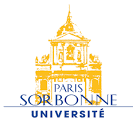La doctrine des catégories et les conditions de la description phénoménologique dans la première philosophie de Husserl
Thèse de doctorat soutenue à l’Université Paris-Sorbonne le 20 novembre 2010, sous la direction du Pr Jean-François Courtine
Title: Meaning, Knowledge, and Perception: The Theory of Categories in Husserl (originally in French)
Graduation: Nov 20, 2010
Committee: Jocelyn BENOIST (Chair), Robert BRISART, Jean-François COURTINE (Advisor), Dominique PRADELLE
Abstract: The purpose of this work is to investigate the roots of phenomenology and to analyse, from a historical and systematic point of view, the reasons that enabled Husserl to bring forth in his Logical Investigations a new philosophical method based on a descriptive psychology and on a logical analysis of consciousness contents. I highlight the fundamental role that Husserl’s theory of categories plays in his philosophy of mind and stress in particular the importance of his analysis of ‘categorial intuition’ for the phenomenological method itself. I claim that this theory provides an original account of the impact of linguistic structures on perceptual knowledge, and argue against standard interpretations that the phenomenological method requires an acute consideration of the tensions between language and perception. The ‘breakthrough’ of phenomenology was made possible by Husserl’s investigations on the specificity of logical forms, and was grounded upon his ability to establish in the Logical Investigations a descriptive distinction between sensitive and categorial forms. Such distinction allows Husserl to account for the possibility of a certain kind of adequacy between language and perception that is necessarily involved in phenomenological description. Indeed, as a descriptive activity, phenomenology entails the opposition between two fundamentally different modalities of intentionality that both take part in description: intuition on the one hand and signification on the other. By making the adequacy between signification and intuition possible, ‘categorial intuition’ not only sheds new light on the relations between thought and perception, or between seeing and thinking, it also legitimates phenomenological description as a philosophical method. This work proposes a new and revisited reading of the Logical Investigations based on an in-depth examination of Husserl’s revision of the theory of categories inherited from Kant. It analyses the relations between this new method for the philosophy of mind, late 19th Century psychology, and Neo-Kantianism.
***************
 Pierre-Jean Renaudie
Pierre-Jean Renaudie 